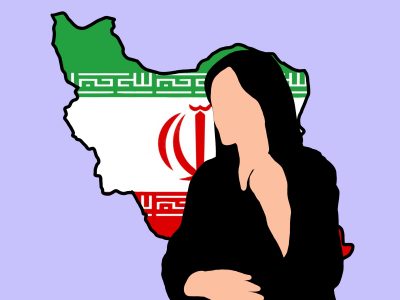The murder of Mahsa Amini on Sept. 16 triggered the eruption of 50-years of rage that Iranians inside and outside of the country have been harboring. It erupted with the screams and frustrated tears of those stifled by the threat on their lives imposed by the government.
The severity of governmental oppression upon Iranians is often heavily neglected — in part due to the foreign policy practiced by the Iranian government that leaves the nation “on the outs” with many Western countries and in part because Iranians inside the country experience heavy censorship in terms of various media platforms that should be putting them in global contact.
Female oppression became a known concept to me very early as a young girl growing up in Iran. I had to accept that my dad could never take me swimming in a public pool or watch my basketball games. I had to cover up my skin and hair in an uncomfortable uniform starting the first grade and envied the characters from my favorite American TV shows who attended school in expressive outfits.

I used to skip school once a week because the school policy forced me to pray to a religion I did not subscribe to. I used to cancel plans at my favorite restaurants because the morality police would be there, waiting for me and my friends to step out of the car to be captured for bad hijab.
I sat through countless lectures about the gravity of women covering their hair and bodies and refraining from singing or dancing in public in an attempt not to arouse men and cause them to sin.
I will never forget the day I learned what the word whore meant. My teacher had referred to me as such for attending a co-ed school in the United States in the fourth and fifth grade.
I had it easy, though. My recounts are nothing compared to the daily lives of my friends who still live in Iran. I’ve always carried the guilt of getting to experience teenage milestones — school sporting events, a first kiss, prom, etc. — that the girls I grew up with never got a chance to do because they were confined to expressing themselves within the four walls of their homes.
The brutal violence exhibited by the Iranian government making global headlines is nothing new to Iranians. Government officials beating women to death, torturing them in jail cells, abducting them and returning their corpses to their families weeks later have all become a sort of norm that Iranians live with.
What’s ironic is that it is all in the name of morality. A morality code that the Islamic Republic of Iran forced unto a nation that wasn’t even Muslim before the revolution and has been used to excuse decades of oppression and cold-blooded murder.
Make no mistake. Our problem is not, and never has been Islam. Our problem is that we did not choose to be Muslim, rather we subscribed to the religion without ever really even learning its proper practice as a survival tactic.
My other problem is that in this 21st century — though civil equality has certainly not been fully accomplished — women have taken strides. Many Muslim countries are allowing women more civil liberties — yet the Iranian government refuses those rights to Iranian women, even though many do not even practice Islam inwardly.
When it comes to forced hijab, Iranian women’s protests are often neglected on the accounts that our main concern is fashion, when what is really at stake is civil liberty and autonomy.
A person’s clothing choice is often an expressive medium. When a woman feels beautiful in her choice of clothing, her hairstyle or her figure, it motivates her to conquer other aspects of her life. There’s nothing sexual about it. Yet, Iranian women have been robbed of the opportunity to feel beautiful and empowered for 43 years.
How ironic and amazing is it that after so many years of watching the government neglect their rights, it is the women of my country who have erupted a revolution many Iranians — men and women — have been patiently awaiting. These women embody bravery as they shed their bodies of the mandatory hijab and raise their voices in the streets knowing all too well that they may not make it back home.
Tears well up in my eyes, as an Iranian woman, when I think of the years of suffering my people have been through. The thought of the innocent lives lost in this revolution breaks my heart. Yet, I am overjoyed to finally see my people demand the revolution they have been aching so long for, and from the other side of the world I am determined to do everything in my power to help.























































































































Kathleen O’Meara • Oct 27, 2022 at 12:32 pm
Your writing is powerful, words matter. Your article moves me to tears and action. Thank you for sharing your personal experiences. This openness highlights the oppression of the Iranians in a more poignant, daily way.